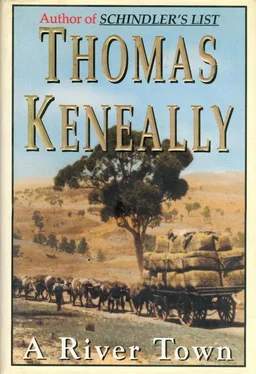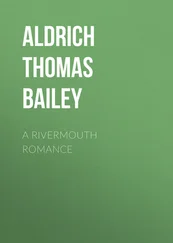Thomas Keneally - A River Town
Здесь есть возможность читать онлайн «Thomas Keneally - A River Town» весь текст электронной книги совершенно бесплатно (целиком полную версию без сокращений). В некоторых случаях можно слушать аудио, скачать через торрент в формате fb2 и присутствует краткое содержание. Город: New York, Год выпуска: 2011, ISBN: 2011, Издательство: Nan A. Talese, Жанр: Историческая проза, на английском языке. Описание произведения, (предисловие) а так же отзывы посетителей доступны на портале библиотеки ЛибКат.
- Название:A River Town
- Автор:
- Издательство:Nan A. Talese
- Жанр:
- Год:2011
- Город:New York
- ISBN:978-0-307-80063-3
- Рейтинг книги:4 / 5. Голосов: 1
-
Избранное:Добавить в избранное
- Отзывы:
-
Ваша оценка:
- 80
- 1
- 2
- 3
- 4
- 5
A River Town: краткое содержание, описание и аннотация
Предлагаем к чтению аннотацию, описание, краткое содержание или предисловие (зависит от того, что написал сам автор книги «A River Town»). Если вы не нашли необходимую информацию о книге — напишите в комментариях, мы постараемся отыскать её.
.
A River Town — читать онлайн бесплатно полную книгу (весь текст) целиком
Ниже представлен текст книги, разбитый по страницам. Система сохранения места последней прочитанной страницы, позволяет с удобством читать онлайн бесплатно книгу «A River Town», без необходимости каждый раз заново искать на чём Вы остановились. Поставьте закладку, и сможете в любой момент перейти на страницу, на которой закончили чтение.
Интервал:
Закладка:
“And I remembered anyhow, Tim, as I read it all. You were, I seem to remember, a first class rough batsman, a walloper. Hook shots I believe. Whack! There’s to be the Married versus Single Men Cricket game at Toorooka up the river. I’m the Marrieds’ captain. Clarrie Bertram’s got the damn meningitis. Would you join us at the wickets, son?”
Tim growled, “Never respected that bloody English-gentleman game.”
“I’ve heard that speech before,” said Wooderson, laughing. “There’s a throwing at the stumps contest at lunchtime. Bob to enter. Three quid first prize.”
More than boarding school fees for a small orphan.
Wooderson said, “You’ve got a bloody good eye, Tim. The Terara will take us up to Toorooka for the game.”
“Quicker to bloody crawl there on hands and knee, wouldn’t it be?”
“Yes, but a steamer trip! Nothing like it for novelty. Bring Kitty and the kids, Tim. Lovely day.”
“I see that New South Wales has Victoria in great trouble at the Sydney Cricket Ground,” said Tim, finding the place in the Chronicle . New South Wales First Innings, 7–385, Victoria 8–187. Put the bloody Victorians in their place! Sydney people liked to do that.
“Clyde’s done the damage,” Tim remarked further. “Took 6 wickets for 37 runs.”
“Ah,” said Wooderson. “An English game eh, Tim? Except when New South Wales is dishing Victoria.”
Tim grinned behind his moustache. “Go to buggery, Wooderson. But I will play for you if you really require it.”
Wooderson was lucky to get him at the right hour. The secret truth was that the good fellowship was mere playing at fraternity. Were grocery stores and stock agencies and lawyers’ offices really run according to the laws of social cricket, where to lose your wicket in a comic runout could actually increase your social standing, if you took it well and joined in the laughter? Whereas to lose at commerce… another matter utterly.
He would rather read the latest Victor Daley poem in the Bulletin under the peppertree than go out pretending to love the ten other cricketers on his side, and—over beer—the eleven opponents. The Singles. What a cracked concept to base teams on!
All this solemnity he got from his own father Jeremiah, who’d always mistrusted over-easy sociability. Jerry Shea, small landholder of great style. Too educated for the purposes of a 15-acre farm and 7 pigs. Too literary to be a part-time clerk. He’d loved the English writers—Hood and Lamb and Hazlitt and Pope—and neglected his native Gaelic. He’d spent just one charity term with the Jesuits in Mallow and they’d talked him into betting definitely on English, as if that could give him the place he’d wanted in the world. It was another instance: no one connived at their own destruction the way the Irish did. And yet the newspapers cast them as totally dangerous to others. The thousands of the poor Paddy bastards who were perishing at Spionkopf and other Cape Colony and Natal battlefields weren’t dangerous to anyone any more. But they got little bloody credit for it.
As he contemplated the impending cricket match at Toorooka with these thoughts, an astonishing realisation struck him. I am playing in Marrieds versus Singles from some mongrel of an idea that the girl’s lover might be a square leg or in the covers or at mid-wicket.
Wooderson was watching him, looking amused.
“Have you seen that blackguard Habash on your route?” Tim asked to distract himself. “The son. The younger one.”
Wooderson grinned. “The one with the horses. The reckless rider?”
“That’s the blackguard.”
“He’s working out at Pola Creek, I believe.” Wooderson really started to laugh now. “I take it you want to thank him.”
“Thank the bastard? It’s more murder.”
Four

TIM PUT HIS HAT on the back pew of the Primitive Methodist church in Euroka. A church utterly humble in its unadornment. He could see the appeals of humility, the Christianity of plainness.
He pointed Lucy forward towards the coffin, and the pew where Mrs. Sutter sat with her four children and young Hector, who looked as brightly kept as the rest.
“You go and sit with your brother,” Tim said.
Pews, and a lectern. Plain frosted glass in the windows behind. No single aid to the remembrance of God. No stained glass, no statues, no intercessors. The plain act.
A man wasn’t supposed to be here. Meant to get the permission of your parish priest, tra-lah, for the deaths and marriages of your heretical and dissenting neighbours. If he was damned for sitting in a back pew, then the clergy were welcome to heaven. Poor coughing Bruggy. Welcome to coughless paradise.
But Jesus this was as bare as the South Pole when put beside the rich, coloured jungles of the Catholic piety he was bred in and Kitty savoured. All its beings, its saints more brilliant than a tiger and more potent. This little Methodist place was something different: on this ice you could be God’s Eskimo, in this desert God’s Arab. The vacancy spoke. Part of the deranged season was that he could imagine himself a Primitive Methodist, going for this cleanness, condemning the overdone other. Heretical thought. But there was a tendency in him to respect traditions more austere. If he were raised to it, this Euroka Methodist sort of thing would suit his character, his mistrust of stagey things. Whereas Kitty needed the forests of devotion, the scarlet martyrs, the bright blue intercessors.
In this underdecorated, scoured air, Kitty’s scapulars to Saint Anthony and special devotion to Saint Blanche, the saint of goitres, a condition to which the Kenna family were susceptible, could look pagan as blazes.
She could forget Saint Blanche anyhow, said Mr. Nance the chemist. There was plenty of iodine in the Macleay water. Tim didn’t know how it got there. Into the rain-fed tanks at backdoors. Did Nance and other benefactors go around pouring it into household water supplies? The river rich in it too. Go swimming and swallow one mouthful, and you swallowed most of the minerals and chemicals. That rich, broad, healthy, muddy river his son tried to live in.
The Colemans from Glenrock in the second row, with their big bony hands which had kept Albert’s herd milked. An official from the Good Templars, Mr. Gittoes—Albert Rochester must have been a lodge member. All there to hold back the waters of eternity and oblivion from washing poor Albert’s face utterly away. What remained of it.
Lucy had by now sat beside her brother, who’d tried to tell her something. Like a good convent school girl, she hushed him. She didn’t seem to want his domestic news. She pointed towards the coffin, fixed Hector’s attention on it. Not hard to do. The young child’s head did not move any more. All the churches had this one big mystery, free of charge, without debate. Death.
Mr. Fyser the minister came up the aisle of the church, wearing a suit. No brocaded vestments, of course. He stopped and spoke to Mrs. Sutter. He shook his head a little. “Expecting to marry you rather than bury Bert,” he could be heard saying.
Then he went to the rostrum and read the “Our Father” and uttered his confidence that Albert Rochester had been saved. Well, that was different. Here in the plain Methodism of Euroka, the story was ended when it ended. Judgment had already been made, redemption already received. No five bob Masses for the dead. No writhing crowds of the imperfect in Purgatory to be relieved by prayer and sacrifice, by going without rum! A great deal of fuss saved. Except you had to ask what could Mr. Fyser, grey suit and little dicky collar, do if haunted by the face in Hanney’s bottle? Where was there something in this purity to combat the more luxuriant ghosts?
Читать дальшеИнтервал:
Закладка:
Похожие книги на «A River Town»
Представляем Вашему вниманию похожие книги на «A River Town» списком для выбора. Мы отобрали схожую по названию и смыслу литературу в надежде предоставить читателям больше вариантов отыскать новые, интересные, ещё непрочитанные произведения.
Обсуждение, отзывы о книге «A River Town» и просто собственные мнения читателей. Оставьте ваши комментарии, напишите, что Вы думаете о произведении, его смысле или главных героях. Укажите что конкретно понравилось, а что нет, и почему Вы так считаете.












